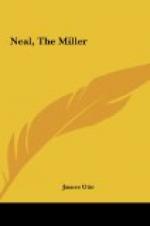“But, Stephen, I can’t go up the Pascataqua without some preparation. I must at least have my musket and ammunition; otherwise, I would stand a good chance of starving to death.”
“I have arranged for that portion of the business. Your knapsack, well filled by your mother, and everything you may need during a few weeks in the woods, is hidden a couple of miles down the road. I brought the things as far away from the farm as I thought necessary, and then left them in the bushes.”
CHAPTER IV ON THE PASCATAQUA
Twenty-four hours after Stephen Kidder had warned Walter Neal against returning to Portsmouth the latter was skirting the west bank of the Pascataqua River, within sight of the tract of land whereon he hoped to see at some day a grist-mill owned by himself.
When Stephen selected such goods as he thought Walter might need during his enforced retreat, he did not neglect anything which would possibly be useful to the fugitive, and the result was that when the young messenger started through the pathless forest, his load was so heavy as to retard his progress very decidedly.
Therefore it was that on the following morning he had not yet arrived at his proposed destination, although it was but a comparatively short distance from Portsmouth.
He had slept in the woods where night overtook him, and at the first faint light of day was making a frugal breakfast of the bread and cheese sent by his mother.
When the gloom of night had been dispersed by the heralds of the approaching sun, Walter was at that point on the river from which he could see the landmarks of his tract, and the knowledge that he was about to enter on his own possessions served to cheer his drooping spirits.
“If it is necessary to skulk around here in the woods to avoid being seen by Sam Haines, there is no reason why I should not make the most of my time,” he said to himself, as hope began to spring up once more in his breast. “There is little chance I shall be able to raise any money for the mill now, when I have been defrauded of a goodly portion of my poor possessions, but I can at least make preparations for the day when I shall be in a position to carry out my plans. It is better to work than remain idle.”
It was the first time since he took leave of his friend Stephen that the mental burden had been lightened, and now he pressed forward eagerly, impatient to begin the work resolved upon.
There was very much which he could do toward making ready for the erection of that wished-for mill, and he felt confident the labour would not be useless, although performed so far in advance of the building operations.
With this idea in mind, his first care was to select the most advantageous spot for a mill, and to this end he deposited his burden on the shore of the river, where it could readily be found again, after which he set about inspecting the property.




